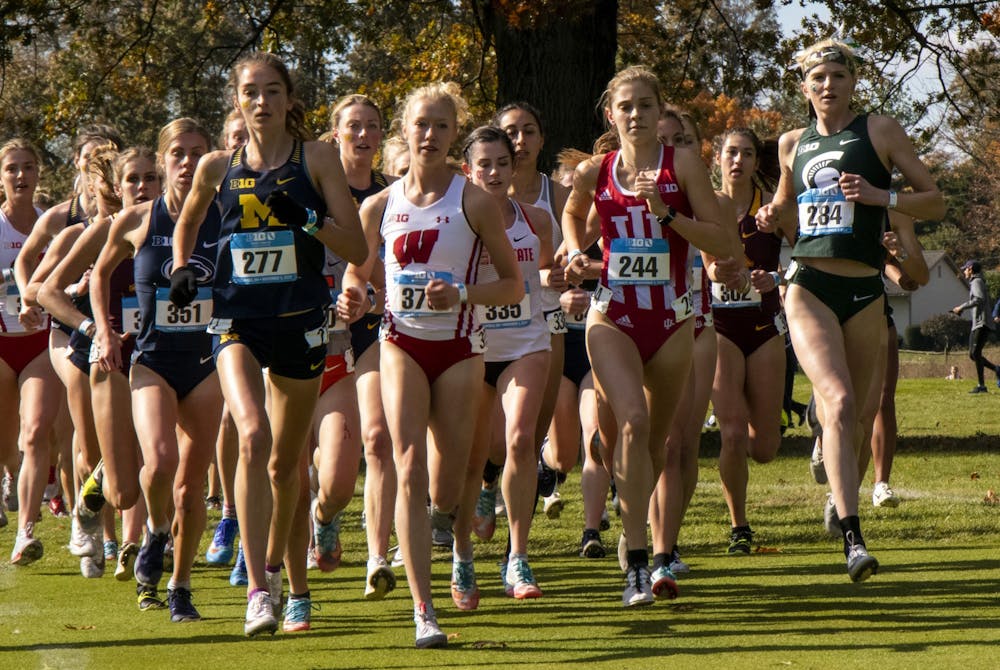Every school’s cross-country teams have been forced to adjust its recruiting plans due to the ongoing recruiting dead period the NCAA has put in place due to COVID-19. But for IU, recruiting in the middle of a global pandemic has been especially difficult.
A recruiting dead period means schools may not have any face-to-face contact with recruits. It also bans official visits, which are recruits’ trips to campus paid for by the given school, giving the recruit a chance to see the facilities, meet the team and talk to the staff.
In losing these official visits, IU loses its two biggest advantages over its competition: the campus and the contact with the team.
While other schools across the country also have to deal with the absence of official visits, it's a particularly devastating blow to an IU program that is heavily reliant on its beautiful campus and superb team culture as a selling point for recruits, according to head coach Ron Helmer.
“We always feel that if we can get people on campus, that's incredibly impactful,” Helmer said. “Good kids see good kids, interact with good kids, they're drawn to that. Both seeing and feeling campus and then getting to know the kids are the two big things that we're missing out on.”
As a result of the dead period, IU has been forced to focus less on national recruiting and more on the Midwest, an area they know well. Recruits are allowed to take unofficial visits, where they can come to campuses but not talk with anyone on the team or the staff.
“The recruits that live within five hours, they can do a day trip. They don't have to worry about extensive travel,” said assistant coach Andrew Poore. “They're trusting the opinions of their friends or people they ran against in high school and how their college experiences have been. So when you recruit regionally, and you have that strong regional network, they know the people on your team.”
One such Midwest recruit is Will Jefferson from Whiteland Community High School in Whiteland, Indiana. Jefferson has seen his recruiting process drastically change due to the COVID-19 pandemic and the restrictions which have come with it.
Though he initially planned to commit to a school sometime this month, Jefferson and his family have decided to push back his decision, after being unable to go on any official visits.
“I think that the quarantine has made it a little bit harder. It makes it a little bit less exciting and fun, just because there's just more that's in play other than ‘what school is the best for you,’” Jefferson said. “We are just trying to make the best of it and trying to find the best school even working around the situation.”
Jefferson, who has been in contact with IU, ran a blistering 14:59.6 two weeks ago in the Columbus North Rick Weinheimer Classic at Ceraland Park in Columbus, Indiana. Senior Ben Veatch, who currently runs for IU, is the lone Indiana high school runner with a faster time at the state meet in the past 36 years.
With no flashy recruiting visits and no ability to let recruits immerse themselves in the program, there is an added importance to coach-recruit relationships. In some cases, recruits are making a life-changing decision without even seeing their home for the next four years, so trust in the coaching staff is a key factor for recruits, said Poore.
“The phone calls you would have with recruits normally, there's a lot of conversation that is very process-oriented: scheduling visits and events and talking about meets,” Poore said. “Now, you don't have much to look forward to, so the conversations are just about getting to know them, having small talk, talking through the pandemic, talking about things that don't necessarily have a lot to do with the sport and recruiting as much as usual.”
Regardless of the disadvantages the program may face, Helmer and his staff feel comfortable with where their recruiting is at, and they believe through Zoom meetings, phone calls and various virtual presentations, the program is in a good position with recruits like Jefferson.
“The Midwest is where the bulk of our kids come from, and there’s plenty of good talent and good kids in this area that are very much attracted to the programs that we have here,” said Helmer.




